Marcia Thornton Jones's Blog, page 35
March 19, 2023
Case of the Doubts
In recently scanning Twitter during one of my zoning-out sessions while revising, I came across a Tweet that felt so much like I have the last year doing revisions for my agent. It simply said (and I’m sorry, I missed the author): Everyone who has worked on a novel has said, “I cannot do this.”
Anyone who has revised a novel has said, “I cannot do this.”
Anyone who wants to write a novel has said, “I cannot do this.”
Anyone in the final edits of their novel they’ve read 566,903 times has said, “I cannot do this.”
Doubt seeps into my mind at times, or I feel like every page is a travesty and miscarriage of literacy today.
I suspect I am too hard on myself. I suspect many writers are.
Despite those niggling feelings of lack of self-worth, we must pen on. Keep writing. Revising. Reading. Do what you can with words and follow the path, slow or fast.
I suspect many writers know we are doing what we are meant to do…but carrying through the slow hours, days, weeks, months and years, it can be easy to lose focus and faith. It’s exactly what we need, though. And lies there - in our writing. The paragraphs we love, the sentences or characters. Find one aspect you love in the piece of work and grab on to it.
Just keep penning.
Happy Reading!
AM Peaslee
March 16, 2023
Book Review: The Ogress and the Orphans by Kelly Barnhill
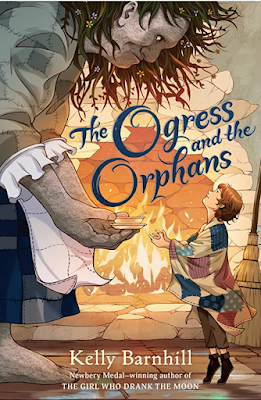 I've read a lot of books, and I've read a lot of middle-grade books, but I don't know that I've ever read one that left me with such a deep sense of satisfaction and peace. To put it plainly, reading Kelly Barnhill's The Ogress and the Orphans, left me feeling that my heart was simply too big for my chest.
I've read a lot of books, and I've read a lot of middle-grade books, but I don't know that I've ever read one that left me with such a deep sense of satisfaction and peace. To put it plainly, reading Kelly Barnhill's The Ogress and the Orphans, left me feeling that my heart was simply too big for my chest. This fantasy takes place in the town of Stone-in-the-Glen, a community that once was lovely. But the town's beloved library burned down, which touched off a series of calamities from which the town has yet to recover. The previously kind and community-minded residents have become withdrawn and self-absorbed. The mayor, a dazzling figure that the townspeople revere with an almost maniacal fervor, seems to have no interest in really helping the town. Life in Stone-in-the-Glen is getting harder and harder. People are hungry and out of work.
On the edge of town has settled an Ogress, and townspeople have taken little notice of her, as she has kept to herself. Over the years, she has quietly built herself a home and garden, taken in a flock of wandering sheep, and befriended the local crows. She is a great dreamer and thinker. She has fashioned a telescope with which she observes the town, looking for some way of befriending the people and finding a way to belong. In her observations, she has noticed that the people have isolated themselves from each other and there's not much kindness to spare. Also, the people are hungry; that, at least, is something she can help with. From the abundance of her garden and the production of her barnyard animals, she brings boxes of vegetables and baked goods to the people. She does so in the dead of night so that no one knows who their mysterious benefactor is.
She is particularly interested in the group of orphans who live on the outskirts near the shell of the burned-out library, because they alone seem immune to the unkindness plaguing the town. The Orphan House, run by an elderly couple named Matron and Myron, has always relied on the town's generosity, but the regular contributions and donations seem to have run out. The couple is hard-pressed to feed and clothe their much-loved charges, and they worry for the childrens' futures as they age. The orphans, for their part, do everything they can to alleviate the pressure on their beloved caretakers.
This lyrical, life-affirming story tackles such questions as who, exactly, is our neighbor? How can we be good neighbors? What makes a family? What makes a community? Who belongs? What about those who are not quite like us? The magical power of stories and books to impact lives for the better is a strong theme that runs throughout the tale. The mysteriously omniscient narrator and the origins of the dastardly mayor are puzzles that will be answered by the end, and I predict that it will be with a sigh, a tear, and a very full heart that you will turn the final page.
March 14, 2023
To Find the Heart of Your Story, Try This
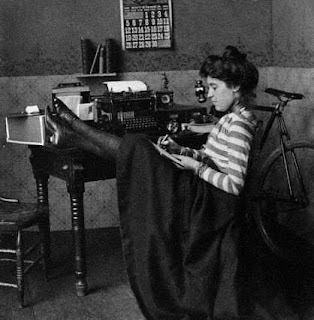 Woman Writes in 1901. (Bettmann / Getty)
Woman Writes in 1901. (Bettmann / Getty)Long, long time ago and in a galaxy far, far away, it was the time before computers. The public library was way, way on the other side of town. There were no bookstores. The only library available to me was my school library. I checked out every book I could read. By fourth grade, my favorite authors were already Mark Twain, Jack London, Charles Dickens, James Fennimore Cooper, Tolkien’s The Hobbit, and many more. And if I wanted to have my very own copy of a book, and not have to return it, I copied the book.
By hand.
Even now, after all these decades, with the onslaught of computers, iPads and fancy programs that write stories for you, I still write everything by hand. Even this article was first written by hand.
It turns out to be a good thing, to write by hand. Scientists now know that cursive writing is an important tool for cognitive development. It teaches the brain to be efficient, helps to develop critical thinking skills and refines motor control. In fact, children who learn cursive tend to learn how to read faster, generate more ideas and retain more information.
When I was copying my books in the fourth grade, I paid more attention to the details of the story. I experienced the characters on a deeper level because the very act of writing them out engaged all my senses. I had to pay attention to the words, how they were ordered, and how they were used. And, of course, I experienced the logical chain of events.
If you want to experience the emotive core, and follow the logic, of your story, write the first draft by hand. And, perhaps the first revision, too.
As William Klemm PhD noted, “There is a spill-over benefit for thinking skills used in reading and writing. To write legible cursive, fine motor control is needed over the fingers. You have to pay attention and think about what and how you are doing it. You have to practice. Brain imaging studies show that cursive activates areas of the brain that do not participate in keyboarding…
Much of the benefit of handwriting, in general, comes simply from the self-generated mechanics of drawing letters.”
The quantity of words becomes less important than the quality of words. Joyce Carol Oates, on writing her stories by longhand, including an 800-page one, states: “Productivity is a relative matter. And it’s really insignificant...
"What is ultimately important is a writer’s strongest books. It may be the case that we all must write many books in order to achieve a few lasting ones — just as a young writer or poet might have to write hundreds of poems before writing his first significant one. Each book as it is written, however, is a completely absorbing experience, and feels always as if it were the work I was born to write.”
In an interview by Buzzfeed writer Hayley Campbell, Neil Gaiman describes how he started writing his novels longhand in the '90s: "I started with Stardust: It was (in my head) being written in the 1920s, so I bought a fountain pen and a big notebook and wrote it by hand to find out how writing by hand changed my head." Candid about the details of his writing process, Gaiman has a collection of over sixty fountain pens:
“Working in fountain pen is good because it slows me down just enough to keep my handwriting legible. Often I use two pens with different colored ink, so I can tell visually how much I did each day.”
As Julia Cameron once said, “When we write by hand, we connect to ourselves. We may get speed and distance when we type, but we get a truer connection – to ourselves and our deepest thoughts – when we actually put pen to page.”
You might be interested to see more:
Campbell, Hayley. “This Is What A Handwritten Novel By Neil Gaiman Looks Like”. Buzzfeed, Dec. 4, 2015.
Cameron, Julia. "Morning Pages: why by hand?. The Artist’s Way". October 4, 2012
Klemm, William. “Why Writing by Hand Could Make You Smarter”. Psychology Today. March 14, 2013.
Prevost, Chad. “8 Legendary Authors You Wouldn’t Believe Write in Longhand”. June 14, 2021.
-- Bobbi Miller
Student Potential by Jennifer Mitchell
Thinking of confrontation as the topic of the blog this month, I spin that as more of accountability in my mind as a teacher. I think students need to be held to standards that they are capable of. If I set my expectations where they place some of theirs at, they would not be working to their full potential. I think kids (and adults) rise to expectations if people believe in their ability. If I allow students to turn in work that isn’t their personal best, I am not challenging them to progress to a higher level. Sometimes that means having one-on-one conversations to share with students what I think they are capable of. With some students dialoguing with them once might work to challenge them to do their best work. Other students need weekly reminders until it becomes second nature. I believe accountability can be effective if it is intentional with a side of compassion. :)
Jennifer Mitchell 3rd grade teacher in the Kansas City area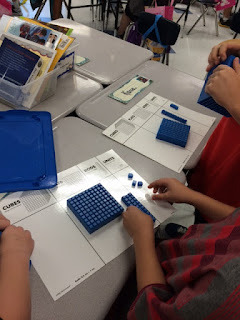
March 12, 2023
Exploring NeuroIdiversity: GOOD DIFFERENT by Meg Eden Kuyatt
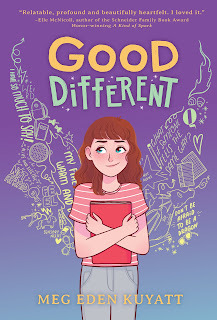
This month I am excited to share a post on a new middle grade book from author MEG EDEN KUYATT about a character who is on the Autism Spectrum. I had the privilege of reading an ARC for this novel in verse and posted an early review.
Here is the book jacket blurb and my review for this important book with an authentic and relatable character.
An extraordinary novel-in-verse for fans of Starfish and A Kind of Spark about a neurodivergent girl who comes to understand and celebrate her difference.
Selah knows her rules for being normal.
She always, always sticks to them. This means keeping her feelings locked tightly inside, despite the way they build up inside her as each school day goes on, so that she has to run to the bathroom and hide in the stall until she can calm down. So that she has to tear off her normal-person mask the second she gets home from school, and listen to her favorite pop song on repeat, trying to recharge. Selah feels like a dragon stuck in a world of humans, but she knows how to hide it.
Until the day she explodes and hits a fellow student.
Selah's friends pull away from her, her school threatens expulsion, and her comfortable, familiar world starts to crumble.
But as Selah starts to figure out more about who she is, she comes to understand that different doesn’t mean damaged. Can she get her school to understand that, too, before it’s too late?
This is a moving and unputdownable story about learning to celebrate the things that make us different. Good Different is the perfect next read for fans of Counting by 7s or Jasmine Warga.
 Here is my review:
Here is my review: I was given an ARC of this book to write a review. I am so glad the book came into my life.
Raw, heartfelt, honest, and true are just a few of the adjectives that describe this powerful story of the life of a teen with autism. This novel in verse highlights the inner life of Selah, the main character who shares her struggles to fit in and follow the rules. Readers will cheer as Selah discovers her true nature through poetry and learns how poems can heal and help others understand. Poems allow her to discover her own truths and how to express her fears to her friends and family. A highly recommended story inspired by the author’s own life.
March 11, 2023
Given the Choice of Opinions, I Choose... (Jody Feldman)
 Just the other day, and definitely not for the first time, I was asked a question then a follow-up, both of which march alongside our monthly theme concerning potential confrontation. Here we go!
Just the other day, and definitely not for the first time, I was asked a question then a follow-up, both of which march alongside our monthly theme concerning potential confrontation. Here we go!THE QUESTION: What do you do if an agent or an editor gives you notes you don’t agree with?
Answer: When I received my editorial letter for The Gollywhopper Games, I assumed I’d be expected to make whatever changes the publisher suggested. The opening paragraph of the letter, however? Totally unexpected. Paraphrasing: This is your book. You have the choice to listen to our suggestions or not.
Without even glancing at what they had to say, I made my choice.The thing is, these professionals work to make books the best they can be, day after day, season after season. They’ve seen which ones succeed and which, less so. Their experience is so invaluable, I needed to take every single suggestion seriously. That, however, that did not mean I’d go along with all their ideas. Instead, I’d look - and I still look - for the reasons behind their concerns and address them in a way to satisfy us both. So far, it’s worked out.
THE FOLLOW-UP: Have you always done that?Answer: Nope. Before The Gollywhopper Games was accepted for publication, I got wonderful notes in the form of a revise-and-resubmit from a dream editor of mine. In part, she suggested that I didn’t go deeply enough into the main character’s wounds. Knowing the editor wouldn’t acquire the book unless I did. I had a choice. I thought long and hard... for 14 seconds.
If I were to dig deeper and darker, The Gollywhopper Games would lose some of the joy at its heart. So, my agent agreed we'd move on. HarperCollins/Greenwillow acquired the book a week later.
BOTTOM LINE: Given the choice of opinions, I go with my gut. It hasn’t failed me.At least, not too often.
Given the choice of two new middle grade ideas, award-winning author Jody Feldman has gone with her gut and is working on one that is slightly outside her lane. We’ll see how that goes...
March 8, 2023
choosing my battles -- by jane kelley
The month of March is named for Mars, the ancient Roman god of war. It seems some people are making a god of war again. Certain battles are worth fighting––even in writing. But which ones are for a good cause? And which aren't?
Many many years ago, my debut novel NATURE GIRL was inching toward the day when it would be on the shelf. This process had many many milestones, all of which were new to me. My amazing editor, Shana Corey, guided me through a lot of revisions with enthusiasm and wisdom.
About a year before the pub date, I got a peek at the cover. The illustrator was Heather Palisi, who had done a fantastic job drawing my heroine's doodles that appear throughout the novel. The cover was great. Brightly colored, fun font, very eye-catching. There was just one problem. The cover had a bird on it. My novel had humans. A dog. A bear. And a fish (which gets eaten). But no birds appeared anywhere.
What was the bird doing there? ON THE COVER––the thing by which my book would be judged (even though everyone says the opposite).
When I asked about this, the answer was, isn't it cute? And yes it was.
But I said, there can't be a bird on the cover. I had to protect my rights as author. Clearly no one had read my book. Why else would they want to feature something that wasn't in it? Didn't they have any respect for me at all? If I didn't defend my book, did that mean that I didn't care about it? Did that mean I wasn't enough of an artist to have an artistic vision?
Did I go to war? Withdraw my book? Break my contract? Try to find a publisher who 'got me'?
No. I remembered the respect with which the entire team at Random House had treated me. I knew they had read the book. Multiple times. And thought about it and how best to share it with the world.
The adorable bird moved from the front cover to the back.

And the title page.

And in the novel itself––after I added this short paragraph to the first chapter.
A brown bird was just a few feet above me. It cocked its head and gave me a look like, "What are you doing in my tree?" Believe me, I didn't want to be up there. But I had to get high enough so that the cell phone signal could make it over the mountains and out of Vermont.
@font-face {font-family:"Cambria Math"; panose-1:2 4 5 3 5 4 6 3 2 4; mso-font-charset:0; mso-generic-font-family:roman; mso-font-pitch:variable; mso-font-signature:3 0 0 0 1 0;}@font-face {font-family:Calibri; panose-1:2 15 5 2 2 2 4 3 2 4; mso-font-charset:0; mso-generic-font-family:swiss; mso-font-pitch:variable; mso-font-signature:-469750017 -1073732485 9 0 511 0;}p.MsoNormal, li.MsoNormal, div.MsoNormal {mso-style-unhide:no; mso-style-qformat:yes; mso-style-parent:""; margin:0cm; mso-pagination:widow-orphan; font-size:12.0pt; font-family:"Calibri",sans-serif; mso-ascii-font-family:Calibri; mso-ascii-theme-font:minor-latin; mso-fareast-font-family:Calibri; mso-fareast-theme-font:minor-latin; mso-hansi-font-family:Calibri; mso-hansi-theme-font:minor-latin; mso-bidi-font-family:"Times New Roman"; mso-bidi-theme-font:minor-bidi; mso-ansi-language:EN-US;}.MsoChpDefault {mso-style-type:export-only; mso-default-props:yes; font-family:"Calibri",sans-serif; mso-ascii-font-family:Calibri; mso-ascii-theme-font:minor-latin; mso-fareast-font-family:Calibri; mso-fareast-theme-font:minor-latin; mso-hansi-font-family:Calibri; mso-hansi-theme-font:minor-latin; mso-bidi-font-family:"Times New Roman"; mso-bidi-theme-font:minor-bidi;}div.WordSection1 {page:WordSection1;}
@font-face {font-family:"Cambria Math"; panose-1:2 4 5 3 5 4 6 3 2 4; mso-font-charset:0; mso-generic-font-family:roman; mso-font-pitch:variable; mso-font-signature:3 0 0 0 1 0;}@font-face {font-family:Calibri; panose-1:2 15 5 2 2 2 4 3 2 4; mso-font-charset:0; mso-generic-font-family:swiss; mso-font-pitch:variable; mso-font-signature:-469750017 -1073732485 9 0 511 0;}p.MsoNormal, li.MsoNormal, div.MsoNormal {mso-style-unhide:no; mso-style-qformat:yes; mso-style-parent:""; margin:0cm; mso-pagination:widow-orphan; font-size:12.0pt; font-family:"Calibri",sans-serif; mso-ascii-font-family:Calibri; mso-ascii-theme-font:minor-latin; mso-fareast-font-family:Calibri; mso-fareast-theme-font:minor-latin; mso-hansi-font-family:Calibri; mso-hansi-theme-font:minor-latin; mso-bidi-font-family:"Times New Roman"; mso-bidi-theme-font:minor-bidi; mso-ansi-language:EN-US;}p.Prose, li.Prose, div.Prose {mso-style-name:Prose; mso-style-unhide:no; margin:0cm; text-indent:36.0pt; line-height:200%; mso-pagination:widow-orphan; font-size:12.0pt; font-family:"Times New Roman",serif; mso-fareast-font-family:Calibri; mso-fareast-theme-font:minor-latin; mso-bidi-font-family:"Times New Roman"; mso-bidi-theme-font:minor-bidi; mso-ansi-language:EN-US;}.MsoChpDefault {mso-style-type:export-only; mso-default-props:yes; font-family:"Calibri",sans-serif; mso-ascii-font-family:Calibri; mso-ascii-theme-font:minor-latin; mso-fareast-font-family:Calibri; mso-fareast-theme-font:minor-latin; mso-hansi-font-family:Calibri; mso-hansi-theme-font:minor-latin; mso-bidi-font-family:"Times New Roman"; mso-bidi-theme-font:minor-bidi;}div.WordSection1 {page:WordSection1;}
Crisis averted. Bridges not burnt. Relationship with editor maintained.
Some people ask me if any of my editors have imposed their visions on my novels. People do worry about losing control of something they have worked so hard to create. I always say that I welcome the input from other people. I assume that they care about my work––or they wouldn't have chosen to publish it.
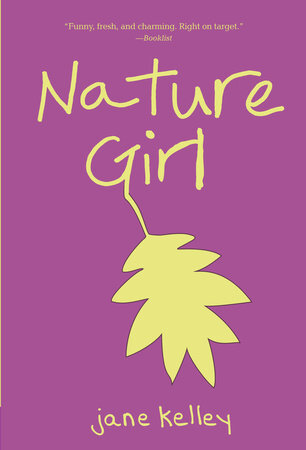
Jane Kelley is the author of NATURE GIRL and many other middle grade novels, including THE DESPERATE ADVENTURES OF ZENO AND ALYA, which does have a bird on its cover.
March 3, 2023
7 Quotes from "The War of Art" that Will Inspire Your Inner Writer Warrior
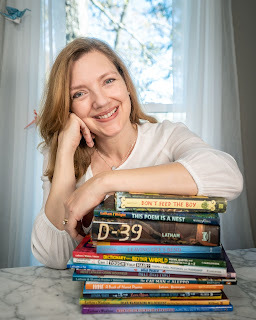 Irene Latham here.
Irene Latham here. And since March is named for Mars, the God of War, I've got the creative battle on my mind.
I pretty much always have this on my mind.
Which is why every few years I read again The War of Art: Break Through the Blocks and Win Your Inner Creative Battles by Steven Pressfield.
Here are 7 quotes I return to for inspiration:
1. "The warrior and the artist live by the same code of necessity, which dictates that the battle must be fought anew every day."
In other words: resistance to our writing, blockage...is NORMAL. No matter how successful you are, resistance doesn't go away. It's simply part of the artist-writer-package. Don't sit around feeling sorry for yourself. Battle through it every day.
2. "If you find yourself criticizing other people, you're probably doing it out of Resistance."
Oh, man, what a reality check this one is! It's not ever really about anyone else. If you're tending you own creative garden, living you authentic life, writing the things that matter to YOU, then you've got no time or interest in criticizing others. Your only job is to encourage. So, if criticism is slipping into your thoughts...it's time to look in the mirror.
3. "What better way of avoiding work than going to a workshop?"
I know, I know. Some of you are really annoyed by this one. I mean, we're told up and down "find your community" and "you need support."
Yes, relationships and community are wonderful. But investing energy in those spaces is really meeting a separate need. And meetups, conferences, etc. can actually be a terrible distraction, eating up precious writing time. When what you need to do more than anything else is write the book.
4. "I'm keenly aware of the Principle of Priority, which states (a) you must know the difference between what is urgent and what is important, and (b) you must do what's important first."
This one has changed me from a "respond to email first" person to a "write the most important thing first" kind of person. I know my best writing happens first thing in the morning. So as much as I'd like to clear the email inbox, it can wait. I write the hard thing, the thing I'm most passionate about first.
5. "The professional is sly. He knows that by toiling beside the front door of technique, he leaves room for genius to enter by the back."
We never outgrow our need for learning and mastering craft. Just like a musician needs to have mastered certain skills on the instrument before reaching a point of being able to really make music, the writer must have a toolbox of technique at the ready. Focus on craft, and inspiration will follow.
6. "The professional self-validates. She is tough-minded. In the face of indifference or adulation, she assesses her stuff coldly and objectively. Where it fell short she'll improve it. Where it triumphed, she'll make it better still."
We've all had the review that hurt, the criticism that stung. But we can't take it personally. We are not our work. And no one else's opinion really matters. Our worth exists outside of that. As hard as it is, better not to pick up the bad or the good. Just keep writing.
7. "When the hack sits down to work, he doesn't ask himself what's in his own heart. He asks what the market is looking for."
Don't be a hack. Write what's in your heart. If it's not what the market wants, so what? Write the next thing in your heart. You'll have a lot better shot in the marketplace when you trust yourself, when you write the thing you simply MUST write.
...and a bonus question-quote that can be a guiding light:
"Of any activity you do, ask yourself: If I were the last person on earth, would I still do it?"
I don't know about you, but when it comes to writing, my answer is YES. Whatever the outcome, whether it sells or not, whether people want to read it or not, I can't not write.
So now you know how to be a writer-warrior. Go forth and write!
March 2, 2023
A Reading List for Spring!
A Reading List for Spring!
As we head into spring, I thought I’d share some insights from five middle grade authors. I interviewed all of them recently about their new books on my blog Book Q&As with Deborah Kalb.
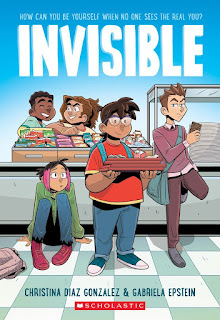
Christina Diaz Gonzalez said of her new graphic novel, Invisible: “Having been a student who learned English after starting school, I always felt a connection with students that were learning English as a second language.” She added, “I noticed that there weren’t many books that showcased them and I also knew how valuable illustrations are when learning a new language. Having the story be in a graphic novel format seemed to make perfect sense.”
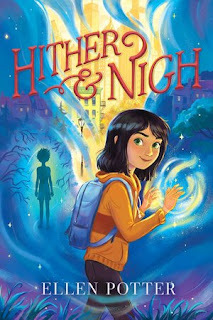
Ellen Potter is the author of the new novel Hither & Nigh. The novel features a magical element, and Potter said, “I suspect that if magic exists, it would slip into your life very naturally, imperceptibly. I don’t think our brains could handle it otherwise. That’s why I tried to melt the familiar with the magical. I want my readers to experience the magical transition the way [my character] Nell experiences it.”
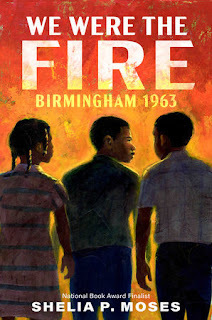
Shelia P. Moses wrote the historical novel We Were the Fire: Birmingham 1963, which focuses on the 1963 civil rights protests in Birmingham, Alabama. “I was inspired to write We Were The Fire after visiting Birmingham in 1989 on a personal trip,” Moses said. “A few years later, I met [comedian and civil rights activist] Dick Gregory and he told me his journey in Birmingham. It changed my life.”
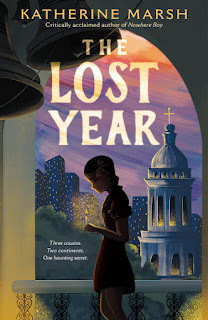
Katherine Marsh set her new novel, The Lost Year, in Ukraine in the 1930s and also in the United States during the Covid pandemic. “I’ve visited a number of schools already on book tour and at every single school--urban or suburban or rural--kids know what is happening in Ukraine,” she said. “This is why it’s ever more vital to give them The Lost Year and a better sense of Ukraine’s 20th century history, especially as there are important historical through-lines between the Holodomor [the famine that devastated Ukraine in the 1930s] and what is happening between Russia and Ukraine today.”
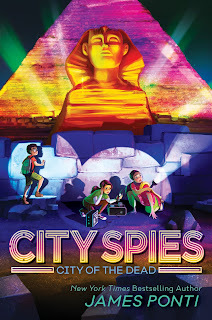
Last but not least, James Ponti has released a new volume in his City Spies series, called City of the Dead. When I asked about his research for the book, he said: “I did a lot of research about ancient Egypt, all of which was fascinating. I interviewed Dr. Kara Cooney, a leading Egyptologist, and she said that when you stand in front of the Great Pyramid, you feel very small, which is exactly what the pharaohs wanted. That got me thinking a lot about intent. Then I began to read about the present-day search for more tombs in the Valley of the Kings and that intrigued me and became a key element of the plot.”
Hope you feel inspired to read one or more of these books this spring!
--Deborah Kalb
@font-face {font-family:"Cambria Math"; panose-1:2 4 5 3 5 4 6 3 2 4; mso-font-charset:0; mso-generic-font-family:roman; mso-font-pitch:variable; mso-font-signature:-536870145 1107305727 0 0 415 0;}@font-face {font-family:Calibri; panose-1:2 15 5 2 2 2 4 3 2 4; mso-font-charset:0; mso-generic-font-family:swiss; mso-font-pitch:variable; mso-font-signature:-536859905 -1073732485 9 0 511 0;}p.MsoNormal, li.MsoNormal, div.MsoNormal {mso-style-unhide:no; mso-style-qformat:yes; mso-style-parent:""; margin:0in; mso-pagination:widow-orphan; font-size:16.0pt; font-family:"Times New Roman",serif; mso-fareast-font-family:Calibri; mso-fareast-theme-font:minor-latin;}.MsoChpDefault {mso-style-type:export-only; mso-default-props:yes; font-size:16.0pt; mso-ansi-font-size:16.0pt; mso-bidi-font-size:16.0pt; mso-fareast-font-family:Calibri; mso-fareast-theme-font:minor-latin;}div.WordSection1 {page:WordSection1;}
March 1, 2023
News
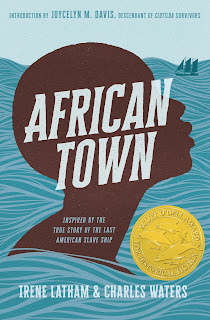 African Town by Irene Latham and Charles Waters is the winner of the 2023 Scott O'Dell Award for Historical Fiction!
African Town by Irene Latham and Charles Waters is the winner of the 2023 Scott O'Dell Award for Historical Fiction! African Town chronicles the story of the last Africans brought illegally to America in 1860, on board the Clotilda, and their journey across slavery, Emancipation, and beyond—including the shipmates' creativity and resilience as they founded a community they called African Town, which still exists to this day in Mobile, Alabama.
Be sure to also check out the documentary DESCENDANT, now available on Netflix.



